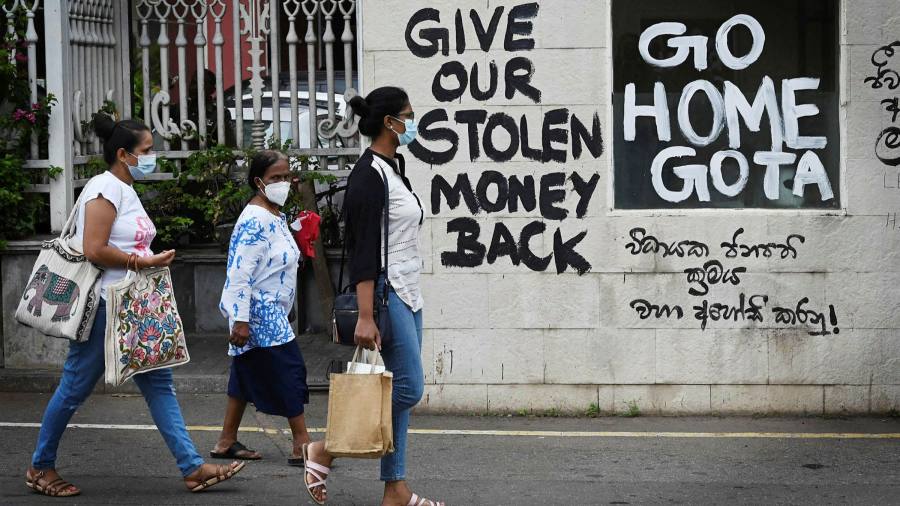To appreciate the challenges confronting Sri Lanka’s new president, take the road to Hambantota.
At the end of a stretch of jungle in the south of the island sits a convention hall for 1,500 people, a 35,000-seater cricket stadium and a massive “international” airport. All are empty and rotting away in the heat.
The infrastructure projects also include a $3.1bn port, which was financed by China and is now controlled by Beijing after the Sri Lankan government incurred heavy losses and gave up on bankrolling it in 2017.
Linked by a deserted four-lane highway, critics point to the projects as the pinnacle of wasteful spending by the once-dominant Rajapaksa clan, which borrowed heavily overseas to spend lavishly in their home region of just 600,000 people.
But the unpaid debts and mounting maintenance costs also reflect the problems faced by Ranil Wickremesinghe as the incoming president prepares to institute painful reforms to secure an IMF bailout and restructure more than $50bn of external debt.
“There’s no fuel so I’ve been cycling 25km every day to get here,” said Bandar, 47, a retired soldier guarding the gate to the $20mn convention hall. The hulking slab of concrete was built with a loan from South Korea and opened by ex-president Mahinda Rajapaksa in 2013.
Sitting by a shuttered gate and an electric fence to keep out elephants, Bandar told the Financial Times that he grew bananas, chillies and rice in his village to survive. Since the government banned fertiliser imports last year, his crop yield had dropped by more than two-thirds.

Mahinda’s younger brother, Gotabaya Rajapaksa, was ousted as president this month after fleeing the country amid mass protests over soaring prices, fuel shortages and a plummeting currency.
Sri Lanka’s debt talks will be closely watched as a test of how Beijing works with other creditors after lending heavily to developing nations in Asia and Africa, which are now under strain from rising inflation and the fallout from the war in Ukraine.
The talks have been held up for weeks due to the turmoil. The deeply unpopular Wickremesinghe should prioritise restoring public order, experts said. But his decision to send in troops to clear a protest site on Thursday night has sparked more protests in Colombo.
Nandalal Weerasinghe, the central bank governor, said the government should waste no time in pushing through “several tax measures, several measures to curtail expenditure and restructure state-owned enterprises”.
But Weerasinghe warned in an interview with the Financial Times that reforming the lossmaking state electricity company, for example, would mean higher prices.
“I realise it’s difficult, but it has to be done. It’s the government’s responsibility to protect the poor and vulnerable who are going to be affected by all these policies,” he said.
Experts said that about half of Sri Lankans would be classified as poor by the end of the year, a stunning reversal for the island of 22mn that was until recently classified as an upper-middle income country.
The central bank this month raised its standing lending facility rate by 100 basis points to 15.5 per cent in an attempt to curb inflation of 55 per cent.
Weerasinghe added that the government should also cut unnecessary public investments and stop importing items such as TVs, cars and mobile phones to preserve hard currency for fuel imports.

The painful reforms are a prerequisite to sealing a $3bn bailout from the IMF, which would unlock another $4bn in financing from the World Bank and the Asian Development Bank.
But the severity of the crisis means that Sri Lanka is also seeking up to $1.5bn from its biggest bilateral backers — China, India and Japan — in bridge financing to immediately resume imports of fuel and gas.
“That should let us manage for the next three to four months until the IMF package kicks in,” said Weerasinghe.
Nishan de Mel, a director at think-tank Verité in Colombo, urged the government to speed up debt talks. “Every month of delay is killing economic functionality and it doesn’t seem like the government has the kind of energy and focus needed to get it moving fast,” he said.
Back in Hambantota, about 160km south-east of Colombo, the fallout from the crisis is illustrated by the snaking line of cars waiting for fuel that have blocked the main entrance to the local chamber of commerce.
Inside, Tilar Nadugala, the head of the chamber, warned that small- and medium-sized enterprises, a significant source of employment in rural areas such as Hambantota, “would collapse in two to three months” if interest rates stayed unchanged. This was because “for people who have taken out loans for projects using floating rates, interest rates have jumped from 12 to 25 per cent”, he said.
Hambantota’s cricket stadium has hosted just 27 games since opening in 2011, he said, but “the convention hall is even worse. At least at the stadium, you can play a game. The centre could host weddings or concerts but local people can’t afford to rent it out.”
Support for the Rajapaksas, whose party still commands a majority in parliament and who have many connections in the region, has melted away.
“I’m very happy that Rajapaksa got kicked out. Whoever is in government has no respect for the law,” said tuk-tuk driver Amith Liyanagedara.
Liyanagedara had been waiting for 18 days in the queue for fuel, sleeping in his vehicle or on the side of the road because buses had stopped running. He said the projects were “good in theory, but they’re not functioning as intended, while we have no medicine, fuel or fertiliser”.
He added that his pregnant wife and their one-year-old son were only eating once per day.
When asked about his future, Liyanagedara said he could barely contemplate it. “For me, it’s the same every day,” he said. “I stand in a queue.”


